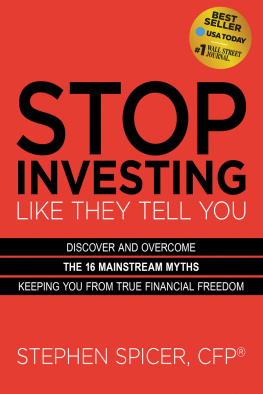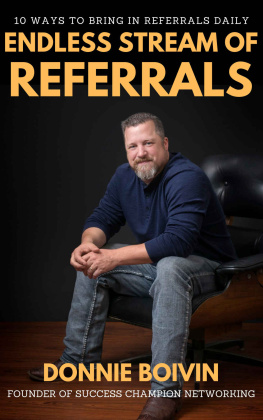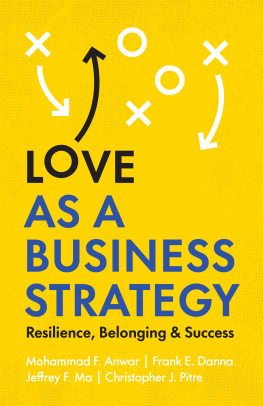Stephen Wershing - Stop Asking for Referrals: A Revolutionary New Strategy for Building a Financial Service Business That Sells Itself
Here you can read online Stephen Wershing - Stop Asking for Referrals: A Revolutionary New Strategy for Building a Financial Service Business That Sells Itself full text of the book (entire story) in english for free. Download pdf and epub, get meaning, cover and reviews about this ebook. year: 2012, publisher: McGraw Hill Professional, genre: Business. Description of the work, (preface) as well as reviews are available. Best literature library LitArk.com created for fans of good reading and offers a wide selection of genres:
Romance novel
Science fiction
Adventure
Detective
Science
History
Home and family
Prose
Art
Politics
Computer
Non-fiction
Religion
Business
Children
Humor
Choose a favorite category and find really read worthwhile books. Enjoy immersion in the world of imagination, feel the emotions of the characters or learn something new for yourself, make an fascinating discovery.

- Book:Stop Asking for Referrals: A Revolutionary New Strategy for Building a Financial Service Business That Sells Itself
- Author:
- Publisher:McGraw Hill Professional
- Genre:
- Year:2012
- Rating:3 / 5
- Favourites:Add to favourites
- Your mark:
- 60
- 1
- 2
- 3
- 4
- 5
Stop Asking for Referrals: A Revolutionary New Strategy for Building a Financial Service Business That Sells Itself: summary, description and annotation
We offer to read an annotation, description, summary or preface (depends on what the author of the book "Stop Asking for Referrals: A Revolutionary New Strategy for Building a Financial Service Business That Sells Itself" wrote himself). If you haven't found the necessary information about the book — write in the comments, we will try to find it.
Stephen Wershing: author's other books
Who wrote Stop Asking for Referrals: A Revolutionary New Strategy for Building a Financial Service Business That Sells Itself? Find out the surname, the name of the author of the book and a list of all author's works by series.
Stop Asking for Referrals: A Revolutionary New Strategy for Building a Financial Service Business That Sells Itself — read online for free the complete book (whole text) full work
Below is the text of the book, divided by pages. System saving the place of the last page read, allows you to conveniently read the book "Stop Asking for Referrals: A Revolutionary New Strategy for Building a Financial Service Business That Sells Itself" online for free, without having to search again every time where you left off. Put a bookmark, and you can go to the page where you finished reading at any time.
Font size:
Interval:
Bookmark:


Copyright 2013 by the McGraw-Hill Companies, Inc. All rights reserved. Except as permitted under the United States Copyright Act of 1976, no part of this publication may be reproduced or distributed in any form or by any means, or stored in a database or retrieval system, without the prior written permission of the publisher.
ISBN: 978-0-07-180820-0
MHID: 0-07-180820-5
The material in this eBook also appears in the print version of this title: ISBN: 978-0-07-180819-4, MHID: 0-07-180819-1.
All trademarks are trademarks of their respective owners. Rather than put a trademark symbol after every occurrence of a trademarked name, we use names in an editorial fashion only, and to the benefit of the trademark owner, with no intention of infringement of the trademark. Where such designations appear in this book, they have been printed with initial caps.
McGraw-Hill eBooks are available at special quantity discounts to use as premiums and sales promotions, or for use in corporate training programs. To contact a representative please e-mail us at bulksales@mcgraw-hill.com.
TERMS OF USE
This is a copyrighted work and The McGraw-Hill Companies, Inc. (McGraw-Hill) and its licensors reserve all rights in and to the work. Use of this work is subject to these terms. Except as permitted under the Copyright Act of 1976 and the right to store and retrieve one copy of the work, you may not decompile, disassemble, reverse engineer, reproduce, modify, create derivative works based upon, transmit, distribute, disseminate, sell, publish or sublicense the work or any part of it without McGraw-Hills prior consent. You may use the work for your own noncommercial and personal use; any other use of the work is strictly prohibited. Your right to use the work may be terminated if you fail to comply with these terms.
THE WORK IS PROVIDED AS IS. McGRAW-HILL AND ITS LICENSORS MAKE NO GUARANTEES OR WARRANTIES AS TO THE ACCURACY, ADEQUACY OR COMPLETENESS OF OR RESULTS TO BE OBTAINED FROM USING THE WORK, INCLUDING ANY INFORMATION THAT CAN BE ACCESSED THROUGH THE WORK VIA HYPERLINK OR OTHERWISE, AND EXPRESSLY DISCLAIM ANY WARRANTY, EXPRESS OR IMPLIED, INCLUDING BUT NOT LIMITED TO IMPLIED WARRANTIES OF MERCHANTABILITY OR FITNESS FOR A PARTICULAR PURPOSE. McGraw-Hill and its licensors do not warrant or guarantee that the functions contained in the work will meet your requirements or that its operation will be uninterrupted or error free. Neither McGraw-Hill nor its licensors shall be liable to you or anyone else for any inaccuracy, error or omission, regardless of cause, in the work or for any damages resulting therefrom. McGraw-Hill has no responsibility for the content of any information accessed through the work. Under no circumstances shall McGraw-Hill and/or its licensors be liable for any indirect, incidental, special, punitive, consequential or similar damages that result from the use of or inability to use the work, even if any of them has been advised of the possibility of such damages. This limitation of liability shall apply to any claim or cause whatsoever whether such claim or cause arises in contract, tort or otherwise.
To my wife, Gaelen McCormick, who gave me the space
to dedicate time to writing, provides me constant
encouragement and inspiration, and is always ready
to cater to my bassist desires .
CONTENTS
by Bob VeresFOREWORD
In the financial planning/investment advisory profession, marketing is the black hole. Planners who embrace the fiduciary standardmy clients interests always come firsttend to underemphasize marketing because it takes away from their client activities. If they do market, they discover that theyve been given a lot of outmoded tools from the so-called expertsseminar marketing, cold calls, e-mail blasts, direct mail, asking clients to give you referrals if you did a good job for them, and so on. You could realistically conclude that the marketing activities most prevalent in our business are ineffective at best and at worst may represent a violation of the fiduciary ethos.
And yet what small business can succeed if it does no marketing?
Over the past 20 years, as a commentator and writer in the financial planning/registered investment advisor (RIA) world, Ive looked at virtually all the marketing programs that advisors are exposed to. I attend 10 or 12 conferences a year and routinely go to the marketing breakout sessions. Usually I find a nugget or two that I can report back to my readers, including tips on how to use social media more effectively, or branding ideas, or suggestions on how to construct a good brochure that describes your practice. But mostly Ive been disappointed.
As a connoisseur of great resources for advisors, I can (and routinely do) recommend a number of really good practice-management books and consultants, terrific tools and outsource services to save time and effort, and any number of astute resources on investments, portfolio management, and economic trends. But I havent found a marketing resource that I could recommend wholeheartedly to advisors who want to build their practices.
Until now.
In Stop Asking for Referrals , Steve Wershing accomplishes several things at once. First, he helps you to deprogram yourself from the outmoded marketing ideas that you knew, instinctively, were ineffective and uncomfortable for clients. Instead, he focuses his full attention on referral marketing, which we all know is where virtually all new clients come from. You get systematic advice on how and why to define a target market niche (which I think is also excellent practice-management advice), how to communicate your services effectively, different ways to burn that message into the minds of your clients (for the first time, I understand the origins of the term brand ), and how to harness the natural, normal social interactions of your clients to serve your marketing effortsall without intruding on their lives or making them feel uncomfortable.
In fact (youll have to read the book to believe this), when you help your clients market your services, youre also enhancing their status with their social peers. This is a win-win situation that will feel comfortable to even the strictest, most fiduciary-oriented advisor.
Youll also learn how to get your clients to help you define your business, create your service package, and bring in businessand once again, they feel like you benefited them. Youll read about the powerful idea of social currency, the positive side of a bad referral, which people around you are most likely to do favors for you, and how to structure joint projects with centers of influenceand perhaps most important, the book will resolve the conflicts and hesitancies you have about marketing your practice.
I happen to believe that your services provide significanteven life-changingbenefits to the people with whom you work and that the world is better served when you begin to attract more clients. When advisors ask me how they should market their practices, Im going to recommend this book. I hope youll accept my recommendation as well.
Bob Veres
Inside Information
ACKNOWLEDGMENTS
This book and the fascinating journey that led to it are the products of the guidance, support, and encouragement of people I am fortunate to have helping me professionally and am grateful to have as friends.
Bruce Peters has been a friend and mentor for over 20 years. As a coach, he has helped me recognize what about me needed improvement. As a business associate, he helped me get started as a consultant, teaching me many of the finer points of organizing and facilitating client advisory boards. As a friend, he has always been available as a sounding board and a shoulder to cry on.
Next pageFont size:
Interval:
Bookmark:
Similar books «Stop Asking for Referrals: A Revolutionary New Strategy for Building a Financial Service Business That Sells Itself»
Look at similar books to Stop Asking for Referrals: A Revolutionary New Strategy for Building a Financial Service Business That Sells Itself. We have selected literature similar in name and meaning in the hope of providing readers with more options to find new, interesting, not yet read works.
Discussion, reviews of the book Stop Asking for Referrals: A Revolutionary New Strategy for Building a Financial Service Business That Sells Itself and just readers' own opinions. Leave your comments, write what you think about the work, its meaning or the main characters. Specify what exactly you liked and what you didn't like, and why you think so.







